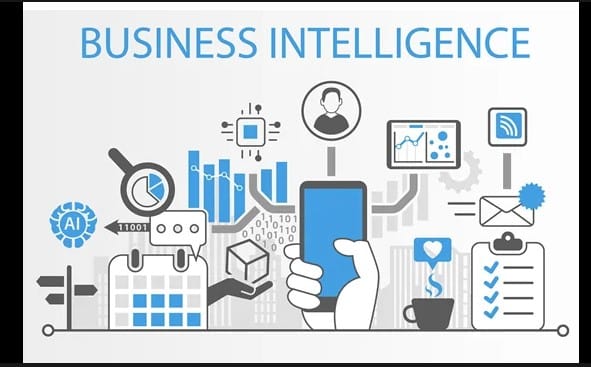What Is Business Intelligence ( BI )? Types and Benefits
What Is Business Intelligence (BI)?
Business Intelligence, or BI, is a technology-driven process used to analyze data and present actionable information to help corporate executives, managers, and other end-users make informed business decisions. BI encompasses a wide variety of tools, applications, and methodologies that enable organizations to collect data from internal systems and external sources, prepare it for analysis, develop, and run queries against the data, and create reports, dashboards, and data visualizations to make the analytical results available to corporate decision-makers.
Why Business Intelligence Matters
Ever wondered why BI is such a buzzword? The crux of the matter lies in the data. We live in the age of data, and businesses are overwhelmed with information from various sources. BI tools help decipher this data and provide valuable insights that drive business growth.
How Does Business Intelligence Work?
How does BI turn raw data into meaningful insights? The answer is through a cycle of data access, data discovery, and information management. BI software accesses the data, organizes it, and applies analytical models to generate a comprehensible output. This output, presented through reports, visualizations, summaries, or dashboards, assists decision-makers in implementing effective business strategies.
Diving Deeper: Types of Business Intelligence (BI)
BI is a broad term that encompasses various methods and approaches. Let’s get into the specifics and understand the types of Business Intelligence (BI).
Descriptive Analytics: The Rear-View Mirror
Descriptive analytics is like looking in the rearview mirror. It utilizes data aggregation and mining techniques to provide insight into the past and answer: “What has happened?”
Diagnostic Analytics: The Autopsy Report
Diagnostic analytics takes the insights from descriptive analytics and digs deeper to answer: “Why did it happen?” This type of analytics is characterized by techniques such as drill-down, data discovery, correlations, and data mining.
Predictive Analytics: The Crystal Ball
Predictive analytics uses statistical models and forecasting techniques to understand the future. It’s all about providing a best assessment on what will happen in the future.
Prescriptive Analytics: The Roadmap
Prescriptive analytics goes beyond predicting future outcomes by also suggesting actions to benefit from the predictions and showing the decision maker the implications of each decision option.
Reaping the Benefits: Advantages of Business Intelligence (BI)
Now that we know What Is Business Intelligence (BI)? Types and Benefits, let’s delve into the specifics of how BI brings numerous benefits to the business landscape.
Improved Decision Making
BI provides tangible facts and data, thereby eliminating gut feeling or instinct-based decision-making. In turn, this data-driven approach promotes efficiency and accuracy.
Increased Operational Efficiency
By streamlining and automating regular reporting processes, BI tools can save time and reduce errors, leading to increased operational efficiency.
Identifying Market Trends
BI can help businesses stay competitive by identifying market trends, understanding customer behavior, and staying ahead of the curve.
Gaining a Competitive Edge
Companies that employ BI have the edge over their competitors as they are equipped to understand and respond to market dynamics efficiently.
Frequently Asked Questions
Here are some FAQs to add more clarity to What Is Business Intelligence (BI)? Types and Benefits:
1. What is the main purpose of Business Intelligence?
The primary purpose of Business Intelligence (BI) is to enable access to and analysis of information, leading to a better and faster decision-making process. It helps organizations turn raw data into meaningful and useful information for insightful business analysis.
2. What are some examples of Business Intelligence tools?
There are numerous BI tools available in the market today. Examples include Microsoft Power BI, Tableau, QlikView, and SAP BusinessObjects BI. These tools offer various features for data visualization, reporting, analytics, and more.
3. Can small businesses benefit from BI?
Absolutely! Regardless of the size, any business that generates data can benefit from BI. BI tools can help small businesses understand their customers better, improve performance, increase sales, and much more.
4. What are some challenges in implementing BI?
Implementing BI could come with its set of challenges, like resistance to adopt new technology, data privacy concerns, lack of skilled staff, or insufficient quality of data. However, with the right planning, these challenges can be overcome.
5. How does BI improve decision-making?
BI provides insights based on the analysis of historical and current data, predictions about future trends, or performance of business processes. These insights provide a factual basis for decision-making, leading to improved business outcomes.
6. How is BI different from Data Analytics?
While they overlap in several areas, BI and data analytics serve different purposes. BI helps in making current, actionable discoveries by identifying business trends using data. Data analytics, on the other hand, is more about analyzing raw data to draw conclusions about the information they contain.
In Conclusion
So, to answer the question, What Is Business Intelligence (BI)? Types and Benefits, Business Intelligence is a technology-driven process that transforms raw data into meaningful, actionable insights. The types of BI—descriptive, diagnostic, predictive, and prescriptive—all serve to provide comprehensive insights into a business’s past, present, and future operations. And the benefits? They’re innumerable, from improving decision-making processes to increasing operational efficiency and gaining a competitive edge.
In the modern business era, BI is not just a nice-to-have but an essential tool for survival and growth. So, whether you’re a start-up or a giant corporation, BI has something to offer to help you excel in your business journey.

